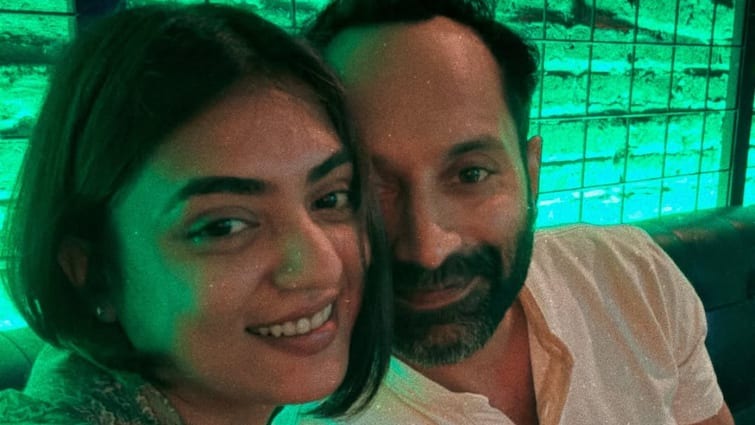
In a heartfelt revelation, actress Nazriya Nazim, widely admired for her candor and charm, opened up about the challenges and transformations in her life after her husband, actor Fahadh Faasil, was diagnosed with ADHD (Attention Deficit Hyperactivity Disorder). Speaking about their journey as a couple, Nazriya shared how the diagnosis brought clarity to certain behaviors Fahadh exhibited and how it has impacted their relationship and daily lives.
The candid admission from the power couple, known for their stellar performances and chemistry both on and off-screen, has sparked widespread discussions about mental health and relationships.
Nazriya Nazim: "I Had Been Dealing With His..."
In a recent interview, Nazriya revealed that while Fahadh's ADHD diagnosis was a turning point, it also explained many things she had been observing in their relationship. She shared:
"I had been dealing with his unique ways of thinking and doing things for a while, but I didn’t realize they were connected to ADHD. The diagnosis gave us a framework to understand it better. It wasn’t always easy, but we’ve grown so much through this process."
Nazriya described how certain patterns, such as Fahadh's restlessness or hyperfocus on specific tasks, made more sense in hindsight. While the challenges were real, Nazriya emphasized that the diagnosis was not a setback but rather an opportunity to approach things with greater compassion and understanding.
Understanding ADHD and Its Impact on Relationships
ADHD is a neurodevelopmental disorder characterized by symptoms such as inattention, hyperactivity, and impulsiveness. While it is commonly diagnosed in childhood, many adults remain undiagnosed for years, often attributing their challenges to personality traits or external factors.
In relationships, ADHD can manifest in various ways:
- Difficulty in Communication: Misunderstandings due to impulsive comments or lack of focus during conversations.
- Emotional Sensitivity: Partners with ADHD may feel overwhelmed or frustrated more easily.
- Inconsistency in Behavior: Shifts between extreme focus on certain activities and lack of attention in others.
For Nazriya and Fahadh, navigating these dynamics required patience, open dialogue, and a shared commitment to making things work.
How the Diagnosis Brought Clarity
Nazriya mentioned that Fahadh’s diagnosis served as a moment of clarity for both of them. While it didn’t erase the challenges, it allowed them to approach situations differently.
"It helped me understand that some of the things I found difficult weren’t intentional. Fahadh wasn’t trying to be dismissive or absent-minded—it’s just how his mind works," Nazriya explained.
With the diagnosis in hand, the couple started exploring ways to adapt to their new understanding of ADHD. This included:
- Seeking Professional Help: Fahadh began working with a specialist to manage his ADHD symptoms through therapy and lifestyle changes.
- Creating Structured Routines: Nazriya emphasized the importance of routines in helping Fahadh stay organized and focused.
- Open Communication: The couple prioritized honest conversations about their feelings and challenges, ensuring that they worked as a team.
Nazriya’s Role as a Supportive Partner
Nazriya’s role in Fahadh’s journey has been instrumental. While she admitted that it wasn’t always easy, her deep love and understanding for her husband kept her grounded. She reflected:
"It’s not about fixing someone—it’s about walking with them and figuring things out together. Fahadh has always been so supportive of me, and now it’s my turn to stand by him."
Her approach highlights the importance of empathy and partnership in navigating mental health challenges. Nazriya also pointed out that while Fahadh’s diagnosis brought its share of struggles, it also deepened their bond and made their relationship stronger.
Fahadh Faasil on Dealing With ADHD
While Nazriya’s perspective has offered a glimpse into their personal lives, Fahadh himself has been open about his experience with ADHD. He has spoken about how the diagnosis helped him embrace certain aspects of his personality and address areas that needed attention.
Fahadh, known for his intense and nuanced performances in films like “Joji” and “Malik,” credited his ability to hyperfocus during shoots as a byproduct of ADHD. However, he also acknowledged the challenges it posed in everyday life, especially in maintaining balance.
Breaking the Stigma Around ADHD
By openly discussing Fahadh’s diagnosis and its impact on their lives, Nazriya and Fahadh are contributing to the larger conversation about mental health, particularly within relationships. Their story underscores the importance of:
- Awareness: Recognizing symptoms of ADHD and seeking professional help.
- Empathy: Understanding that neurodivergent individuals are not defined by their challenges but by their unique strengths.
- Support Systems: The role of loved ones in creating a safe and accepting environment.
Their candidness has resonated with fans and mental health advocates, inspiring others to open up about their own journeys.
Read More: The Pressure of Perfection Why Mrunal Thakur’s Ex-Boyfriend Tried to Out-Muscle Hrithik Roshan

 Share
Share



